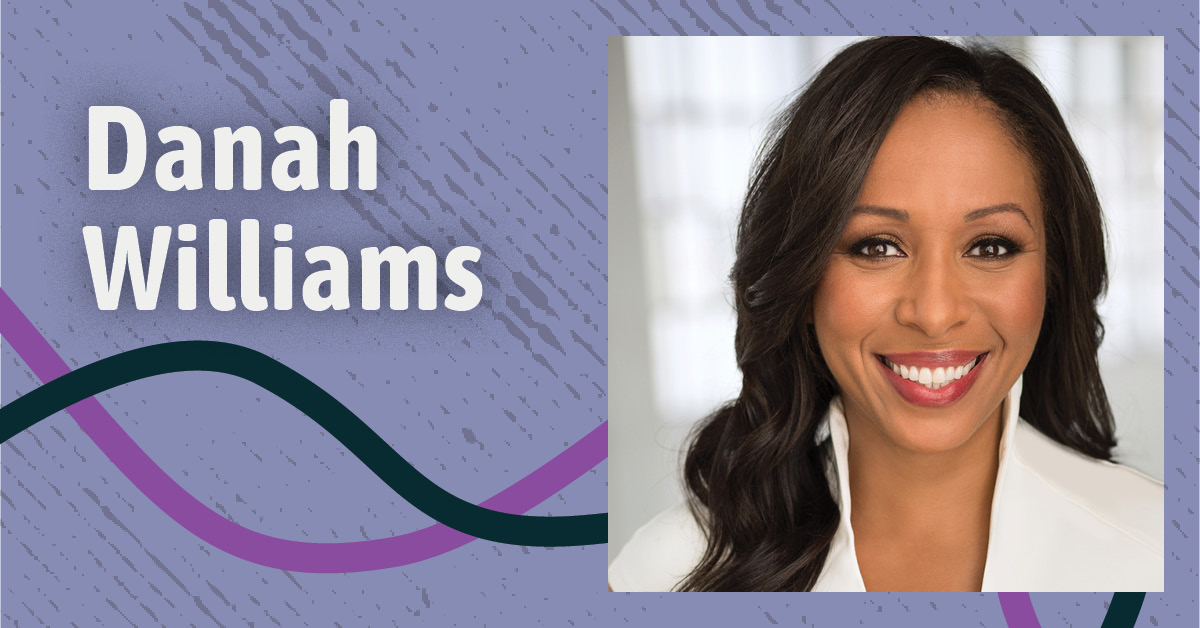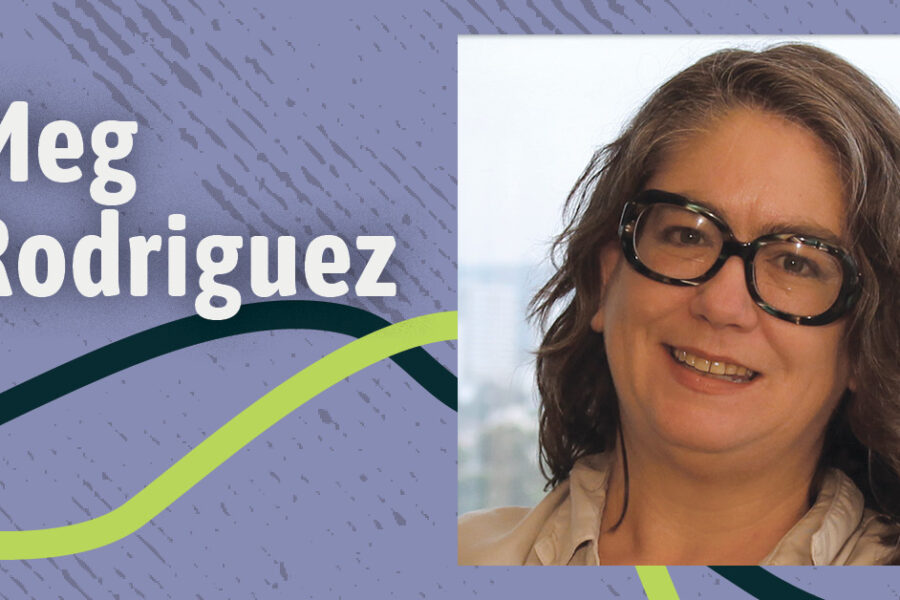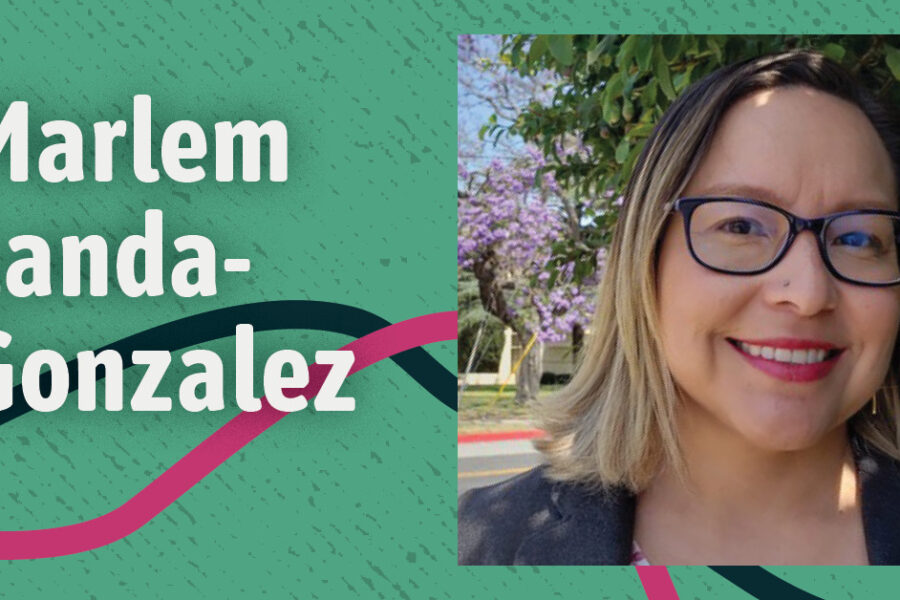“We all have inherent value and worth,” says Danah Williams, but unfortunately we live in a society that often stigmatizes people for many different reasons, from the color of one’s skin to experiences of illness and disability. Williams sees clearly the many ways that these forces especially impact mental health, because this alum of the MA in Clinical Psychology at Antioch Santa Barbara is a practicing therapist.
When Williams originally opened her private practice in Santa Barbara, she was the only Black therapist in private practice who was accepting new patients in her community. This lack of representation showed persistent biases and forces in her chosen profession—and she decided to work against them. Williams became deeply involved in the California Association of Marriage and Family Therapists (CAMFT) on the local and state level of the organization. Today, a decade after graduating from Antioch, her leadership at CAMFT has taken her to its highest non-staff position: President on CAMFT’s Board of Directors. But she’s not resting on her laurels. Instead, Williams is using her position to advocate for necessary changes to ensure that the people who need therapy—and who could be valued therapists—are able to access this profession. In many ways, it’s a continuation of her life’s work.
The Path to a Helping Profession
Although Williams’s friends often told her that she should work in the mental health profession, it was a winding path that brought her to become a therapist. Professionally, Williams has always been drawn to the creative arts and helping people. She has a passion for instilling hope and inspiring others to live fulfilling, healthy, rewarding lives. When entering the workforce, however, she did not immediately find a sustainable career that meshed all of her passions. While building a professional acting career, she discovered a passion for film production. She gained experience in various positions in Hollywood from serving as accounting clerk for the TV show Lost, Assistant Producer on Sci Channel’s Warbirds, Assistant to the Producer on Home of the Giants. She also landed a supporting role in her first full length feature film Encounter with theatrical, streaming and network television release.
Though it was creatively rewarding, employment in the entertainment industry was uneven and didn’t always pay the bills. Pausing her focus on the performing arts, Williams answered the call to serve others and accepted an entry level position at a non-denominational mega-church where she worked her way up to a senior leadership position as Director of Small Group Ministry over the course of three years. Ultimately, systemic resistance to women serving in senior leadership led to a separation in employment. But the seed for offering individual and group support services had firmly been planted within her.
Determined to earn her bachelor’s degree, Williams maintained enrollment in university through multiple geographical moves and professional transitions. At times, she balanced full-time employment with a course load of over twenty-two units. It was particularly difficult because her partner at the time served in the United States Navy, which required frequent relocations of her family. This forced Williams’ to transfer universities multiple times. Through trials, tribulations and major life transitions, Williams continued her studies while fully supporting herself. After an unconventional ten year journey, she graduated with her Bachelors of Science in Organizational Leadership from Azusa Pacific University.
With this new academic achievement, Williams had a chance to consider career possibilities that would bring both personal fulfillment and financial freedom. As she pondered the question of what to do after the completion of her bachelors’ degree, she thought about how she loved helping people and wanted to effect positive change. At first, she didn’t see herself becoming a therapist because, as a sensitive, empathetic person she was concerned she would internalize the pain of others. But she didn’t rule it out. She took a bunch of career and personality aptitude tests, and as she explains it, every test “rendered the same top three career results in no particular order: clergy, creative arts/film & television production, and psychology.” She realized that a career in psychology could be a way to continue helping people while building a career that gave her flexibility to pursue other creative interests.
So she started looking into psychology master’s programs. And in 2010, she enrolled in the Master of Arts in Clinical Psychology program at Antioch Santa Barbara.
Antioch gave her the flexibility she needed to pursue her education while working full-time. And through the duration of her studies, Williams found her Antioch cohort to be very intimate. Having the same group of peers for the most part through all of her learning, she became connected with her colleagues to the point where it felt like a familial connection.
Antioch also provided Williams with an environment of thought-provoking inquiry that previously she had not experienced. She feels this was a catalyst to self-discovery, healing, and self-actualization. Williams appreciates that Antioch has taken active steps to centralize social justice in their mission, and she especially appreciated the times when this mission resulted in tangible action to put the school’s commitment to diversity and social justice into practice.
Finding a Passion in Marriage and Family Therapy
After completing her master’s degree, and becoming a Licensed Marriage and Family Therapist, Williams began to find her way in the profession. It all started with becoming a licensed MFT. “Humans are relational beings, and we’re hardwired for connection,” says Williams. “I just couldn’t imagine a licensure that didn’t promote and look at psychological issues or clinical issues through that lens.”
Part of her practice is a specialization in the therapeutic modality of Dialectical Behavior Therapy (DBT). This evidence-based treatment model builds coping skills in four areas—Distress Tolerance, Emotion Regulation, Interpersonal Effectiveness and Mindfulness—and has been proven to be effective in strengthening clients’ ability to manage distress without losing control or reacting destructively.
Williams actually learned about DBT initially through having a close friend who was struggling with significant PTSD from early childhood trauma. Her friend eventually entered a residential treatment program where they received DBT counseling. Williams’ was an added support to her friend and saw a 180-degree change in this individual’s growth after DBT treatment.
During her master’s program, she also completed a traineeship that included an employer-paid one-year intensive DBT training with noted DBT expert Dr. Alan Fruzzetti. Williams is passionate about DBT and feels that it offers skills not just for those diagnosed with borderline personality disorder but truly for everyone. Because everyone can benefit from learning how to have effective relationships, how to be more mindful in our interactions, how to regulate emotions, and how to handle crises.
A Swift Ascent to CAMFT President
Eight years after graduating from Antioch and becoming a professional therapist, Williams was nominated by the California therapist licensing body—the California Association of Marriage and Family Therapists—to stand in the next election to become president of its board. CAMFT is the largest professional organization of marriage and family therapists in the United States and has a stated dedication to advancing the profession as an art and a science, maintaining high standards of professional ethics, and raising recognition and awareness of the profession. Becoming CAMFT’s board president was an opportunity Williams was excited to pursue, as she has had a long history of serving the association.
In her nomination statement, Williams shared her history of serving CAMFT: three years spent on CAMFT’s Board of Directors; and before that, seven years on the Board of Directors of CAMFT’s Santa Barbara chapter. She had held positions as Secretary, Pre-Licensed Director, Programs Director, and Chapter President. She wrote in her statement that, “In my years of service, I have earned a reputation for professional and ethical integrity through transparent and unbiased leadership.” And in the election that came, Williams was elected President of CAMFT’s Board for the 2021/2022 term.
Working as the Board President has given her a position that ensures she is at the table to effect change association-wide. It also enables her to take any and all feedback she receives from peers and colleagues across the state and to play an active role in implementing those changes. “There’s a lot of honor in joining one’s professional association,” says Williams. But the real excitement is “delving in and getting involved as part of the solution.”
Williams has made such an impact that the CAMFT Board of Directors decided to acknowledge her contributions to the association’s board governance by voting at the March 2022 board meeting to create an award in her namesake: “The Danah Davis Williams Distinguished Board Member Award.” This award will be granted annually to honor the exceptional service of one board member for their efforts in the advancement of CAMFT’s mission. Says Williams, “It is a monumental award that I am humbled and honored to have named after me.”
The Importance of Representation
Williams is a Black woman, and she has committed herself to a career in mental health and therapy that includes increasing her cultural competency and serving diverse populations. It’s something that her field clearly needs. “For the longest time in Santa Barbara, I was the only Black American actively accepting new patients in private practice,” she says. Out of every one of her supervisors throughout her training—and every therapist she has ever sought mental health treatment with—none of them have ever been Black. Luckily, and partly due to her efforts and leadership, this is beginning to change. Says Williams, “Now we’re seeing more representation.”
But this is only a start. Williams believes that representation is imperative. She explains, “When you’re developing a therapeutic rapport with someone, one of the key factors that helps to ensure or facilitate a healthy relationship with your therapist is that you can relate to them.” With increased representation, there can be less minimization of the struggles People of Color face on a day-to-day basis. “If a person of color sees more therapists of color providing treatment, those hesitant to engage in therapy due to cultural stigma may begin to question the internalized narrative,” says Williams. And she shares the example that, with more representation, a Latina seeking treatment might think, “If there is a Latina therapist, then how could it be bad for me as a Latina to talk to a therapist?”
This last example points at another opportunity for the therapy world in Santa Barbara to be more reflective of the populations it serves. With a significant Latinx population, the county would benefit from increased outreach for Latinx mental health. (Read about Antioch’s Latinx Mental Health and Social Justice Institute.)
A Thriving Practice—And Increasing Creativity Moving Forward
Today, in addition to her role as CAMFT’s Board President, Williams sees clients through her own practice: California Coastal Counseling. Williams has built a sustainable career, though she never takes it for granted. She’s grateful to be able to help clients as they face challenges ranging from dealing with toxic or discriminatory work environments to dealing with familial issues and the whole range of emotional disorders. For Williams, who once worried that she would be too receptive to the emotions of clients suffering from immense pain and emotional suffering, it has instead ended up to be a career that’s highly rewarding. She loves seeing patients who come to her from a place of hopelessness and helplessness but over the course treatment find empowerment, recovery, and resilience.
As far as CAMFT, Williams plans to stay involved with the association even after her presidency ends. She sees future projects in committee work and surrounding DEIA initiatives, exceptional board governance, and branding and marketing of the profession of Marriage and Family Therapy that should be done to ensure the vitality and visibility of this field.
While she’s making a positive impact in mental health advocacy and treatment, Williams is also a creative spirit and is increasingly taking her own advice and pursuing projects that embrace all of who she is. Together with the Asian-American filmmaker Jon Lee Brody, she recently started a podcast called the Reel Psychology Podcast. Together, the two hosts look at the mental health of fictional characters in television and film—and they are sometimes joined by celebrity guests.
Continuing in this creative vein, Williams also does consulting work with filmmakers and writers to ensure that the representation of mental health issues and mental health treatment is authentic and responsible in their storytelling. She has worked with large-scale entertainment studios such as MGM, FX, as well as other popular networks, studios, and filmmakers. “I have this personal mission to raise awareness and be a part of destigmatizing not only mental health symptoms but also its treatment,” says Williams. “Sometimes you’ll see things depicted in a negative light or an inaccurate light on television and that might discourage somebody from getting help.” With her help, these entertainments with their sometimes-massive reach are doing better at presenting mental health treatment as it actually is.
Ultimately, Williams sees her own story as one that shows the opportunities that come when we pursue our dreams despite any fears. She wants people who might hear her story to come away with this understanding. “If there’s anybody, or any readers, that are feeling fearful of being their true selves, of sharing their gifts and talents with the world, or taking ownership even of their achievements in their accomplishments,” says Williams, they should “lean into that discomfort, and take the risk of opening up and reaching out.” It might just lead to a satisfying career of service, creativity, and healing.



